Rick Wayne's Blog, page 29
January 19, 2020
(Art) The Majestic Legends of Charles Vess
[image error]
The fantasy art of Charles Vess is acclaimed worldwide, his rich palette, striking compositions, and lavish detail second to none. Vess created memorable works for such best selling fantasy authors as Neil Gaiman, Susanna Clarke, Charles De Lint, and George R. R. Martin, as well as a who”s-who list of publishers and clients. His art is breathtakingly singular while recalling the golden age of illustration.
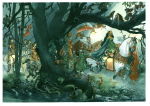
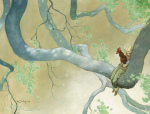




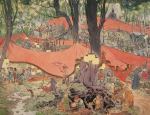



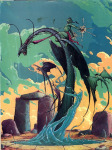





January 15, 2020
Let’s Fight!
[image error]
I had a couple conversations recently about writing fight scenes and how abysmal they usually are to read, even to watch. Action is very tedious, after all. Think of how quickly a car chase gets dull. Or boxing. Those who enjoy it do so for the show of skill and the suspense, same as any sport. For everyone else, it’s boring.
In narrative storytelling, it’s never the fight that hooks you. Ten pages of two men grappling, all of it action, makes a very dull tale. Rather, like sport, it’s the skill and the suspense. In the Marvel films, we enjoy seeing the characters find novel uses for their powers and/or overcome their fears. The fight IS the story. (Even then, those films’ climactic battles often run long.)
In my books, I take a zen approach to action. Zen Buddhism emphasizes meditation and practice over knowledge and study with the aim of producing an epiphany in the adherent. Its numerous parables are designed to jolt the listener into comprehension, often with a clever twist at the end, which is the “action.”
Consciously or not, a lot of Japanese narrative fiction employs this approach. In manga, for example, “fight” scenes typically involve several pages of dialogue followed by a flurry of fists or swords that is over in a few panels. The popular comic One Punch Man reduces that to a single move. Not coincidentally, kendo and sumo wrestling work the same way.
(Asian comics often depict action in a completely opposite way to the West. In a classic Kirby battle, Cap’s shield or Thor’s hammer will bear the motion lines as it zooms toward its target. The viewer is in effect sitting still, watching the action like a movie. In manga, Iron Man’s fist would be drawn “still” and the motion lines would be on the surrounding world, which effectively brings the viewer into the comic. We are “riding” the fist to its target versus passively observing it from afar.)


Before tackling any fight scene, though, first it has to matter, same as for any scene. If the fight doesn’t reveal something about the characters or advance the plot, then it has no reason to be there, period.
In other words, it’s not enough that the characters simply be in peril, even legitimate peril. (Very bad writers don’t even accomplish that — in the case of the Mary Sue, for example, who we quickly realize is never in any real danger.) The challenge the characters face must do more than threaten their lives. It has to threaten their sense of self and/or lead to a revelation.
But I keep the action itself quite short. In fact, I aim for it to be over in a dozen lines or less. I suspect those scenes “feel” longer to the reader — hopefully appropriately long — because, as with the zen parable, most of the words build suspense rather than release it with fists or weapons, but they are experienced as a single event.
This is harder than it might seem. You completely destroy all the suspense you just built if, in the climactic resolution, your plucky heroine simply grabs a nearby rock and hits her attacker over the head with it. For one, she has to be someplace where there are likely to be rocks of the requisite size lying about, otherwise it’s clearly a contrivance. Good fight scenes, then, are not only an extension of the characters but the setting, which I’ve argued before is another character and should be treated similarly.
[image error]
Of course, if you establish that your heroine is in a place with rocks lying about, your audience will see what you are doing — or at least the smart ones will. (Kudos to you if you write for dumb people. It’s easier.) You have to establish the setting such that it’s not obvious what you intend to do, but yet feels completely natural once you do it, and you have to do that without stopping the story for a five-paragraph exposition of the setting. In that case, you still kill suspense, just one level up.
The setting has to be established naturally — in an earlier scene, for example, where it must also be useful — such that the suspense flows naturally to the resolution while at the same time revealing something about the characters or the plot, which is not easy to do.
This is why it takes me about four times as long, on average, to write fight scenes versus any other kind.
Here is such a fight scene from the penultimate chapter of Episode Two of THE MINUS FACTION. Both Episodes One and Two are available for free on Amazon.
T Minus: 036 Days 15 Hours 36 Minutes 10 Seconds
The sun reached its zenith in the noon sky and baked the gravelly lot. A crowd had gathered, but Xana and the dog had been the first to arrive. She wasn’t going to miss her appointment a second time.
Xana had left the McDoom mansion and walked through the night to work, her four-legged friend at her heels. She spent the last of her money on a big meal for both of them. She clocked in at the factory. She washed the heavy grinding blades. She lifted them, moving or turning as necessary a total of twenty-seven times while her co-workers sat and watched. She accidentally cut her arm. On her breaks, she petted her furry friend and gave him water. She looked at the stars. She swept the long factory floors with a four-foot broom. She emptied bins of trash. She heard her co-workers laughing in the hall over cups of coffee. She showered in the locker room. She slept a little.
Xana and the dog walked across town in the early hours of the day and arrived at the junkyard alone. They sat in the shade. They walked around and poked at the piles of junk, mostly auto parts and old furniture. The dog sniffed and peed. Xana found a dirty ball inside a sheet metal shed, the only structure in the enclosure, and she threw it for her friend, who returned it with a smile every time.
The police were the next to show. They said nothing. They didn’t even look at her. Five men piled out of a van with bars over the windows. Two more stepped from a car. All of them had guns. They sat on the hood or paced about smoking cigarettes while the sun moved higher and the heat woke the insects.
Xana looked at the van. It was for her. It sat ready to haul her to jail. Or the morgue.
Then people came. First it was just a few stray locals who wandered by and saw the police and stayed for the show. Those without work have nothing better to do. But soon families appeared. Some had packed lunches. Children scratched in the dirt while their parents laid blankets in the shade and opened warm beers. They chatted with each other, and as the impromptu congregation grew, their voices eclipsed the insects.
No one looked at Xana. No one spoke to her. Not even her cousin. Oja appeared at the gate in tears. Xana stood to greet her, but Morin stepped forth, arm in a sling, and waved her off. He glared at Xana and led his crying wife over to their friends in the shade. Trees from neighboring lots had grown over the block wall that bounded the yard. The crowd filled every shady inch and then spilled into the sun.
At three minutes to noon, Mama’s Mercedes arrived. Tinted windows obscured the interior. The engine shut off. For a moment, nothing happened. Then a door opened and the little girl appeared. She was clutching something.
“Maisie!” Oja called and rushed forward, but Morin grabbed her and held her back. He wasn’t going to risk his wife as well.
A boot hit the dirt, and Boraro the Disemboweler stepped from the car. He surveyed the scene in a dark tank and camo pants. He held the little girl’s arm, shut the car door, and led her to the middle of the clearing.
Xana squatted in the shade, alone. Those in the sun had chosen to brave it instead of her. She had never seen Boraro before. He was worse than she imagined. The frayed leather strap that held his mask to his face looked like it had been tanned from human skin. His arms were massive. She couldn’t tell whose were bigger.
Boraro raised a hand and the whispering crowd went silent. That’s when Xana saw what Maisie was clutching. It was a dead cat. Road kill. Days old and matted. Its mouth was twisted into a silent shriek. Its eye sockets had been picked clean.
“You see?” Boraro called. “I am generous! I accidentally killed her last one, so I got her a new pet. I think she loves it very much, yes?”
Maisie clung to the rotten corpse like it was a stuffed toy, but her face was contorted in disgust. Boraro was making her hug it. Tears traced a single wet path under each of the girl’s eyes. She’d been missing for a day. She was terrified.
Xana pulled the leather gloves out of her back pockets, put her hands in, pulled tight, and made fists. Boraro smiled.
She stepped into the sun. “I’m here. Let her go.”
Boraro released the girl’s arm and raised both hands in a shrug as if to say he hadn’t done anything wrong. Maisie dropped the carcass and bolted through the dry dust to her mother.
“Maisie!” Oja’s arms were outstretched. They hugged. Morin tried to drag them away but Oja objected. She wasn’t going to leave Xana. The pair quarreled quietly in the shade.
Boraro bent and picked up the road kill. He held it in one hand and stroked it with the other. “Do you think she liked my present?”
Xana didn’t answer.
“Who’s your friend?” Boraro motioned to the dog sitting next to Xana’s feet.
Xana looked down at him, then at the masked man. “Just a minute.”
Boraro paced. “Take your time.”
“Come.” Xana led the dog across the lot to Oja and her family.
Morin saw her approach and stepped from the shade. He raised his hand and opened his mouth to object, but Xana pushed him into the dirt with a single jab of her gloved finger. People laughed.
Xana looked at her cousin. “Watch him for me?”
The big dog sat. He was eye-to-eye with Maisie, who reached up and rubbed his head with a smile.
Oja nodded.
Xana looked down at her friend. He looked up, panting. “Stay,” she said quietly. Then she turned and walked back.
“Xan?” Her cousin called.
But Xana kept walking. She stopped in front of Boraro, blocking him from the family. “Alright. I’m ready.”
The masked man smiled. “I doubt that.”
Xana clutched her gold cross through her shirt. She closed her eyes, lifted her face to the sun, and began to pray. “The Lord is my shepherd. I shall not want.”
Boraro laughed and kicked Xana in the gut. She lost the air in her lungs and bent over. The crowd gasped. The Disemboweler took a running step and kneed Xana in the face. The crowd yelled. Some turned away as Xana clutched her face and stumbled back.
Boraro held up his hands and paced in a circle. He was putting on a show. He turned and ran at Xana. She held out her arms, but the man jumped high and plowed her face with his fist.
Crunch.
Xana went down.
Boraro started kicking. He kicked her chest. He stomped over her womb. He kicked her head. Xana curled into a ball in the dirt and protected her face with her leather-clad arms.
Boraro snorted in disgust. He walked over to the road kill. “You see?” he yelled to the crowd. “You see what happens when you do not do as you are told? Today she is like this cat. Today she is road kill. And I am the truck.” He walked to Xana and rubbed the carcass over her face and ponytail.
Xana could smell the sweet stench of decay, could feel bits of hair and hide break into her curls. She shut her eyes.
“Get up!” he yelled.
Xana spat and squinted in the bright sun. She got to one knee. She heard a zipper.
Boraro had opened his pants. Xana could tell by how he held himself that he was going to piss on her, on her head. After rubbing them with filth, he was going to urinate on her face and hair. In her curls. The very last piece of the woman she used to be. In front of Oja and Maisie and everyone.
Xana made a fist.
§ § §
A blow to the chest breaks superficial blood vessels, causing a bruise. Depending on the strength of the attacker, the victim’s rib cage might also flex, creating some stiffness and discomfort, or, if the assailant is very strong, pain and shortness of breath.
That is, a blow from anyone but Xana Jace.
With a pivot of her knee, Xana struck Boraro at center mass. This time there was no hesitation. She held nothing back. She kept her eye on her target and followed through just like her softball coach had taught her.
The Disemboweler’s sternum buckled as the kinetic force from her arm moved into his body. His ribs absorbed what they could, but three fractured and two outright snapped as they transmitted the energy to the rest of his body. As the man’s thorax compressed, his lungs collapsed and his heart was bruised against the back of his rib cage. His chest flew back, pulling his body off the ground and forcing his head, arms, and legs to whiplash. His lower jaw struck his chest, which slammed his mouth shut and sent a stream of spittle into the air. His teeth severed the tip of his own tongue.
Boraro the Disemboweler soared backwards across the lot. His body struck the sheet metal shed, crashed through, and flew out the back. Onlookers dove out of the way as his flight ended at the block wall that bounded the junkyard. His body stopped dead, and his masked head followed with a thud. He fell limp into the dust.
It took only a second. The heads of the crowd whipped as they watched the most feared man in Guyana beaten and destroyed in one blow. He was alive, or so it seemed, but everyone knew. He would never be the same. He couldn’t be the same.
They turned from the crumpled, motionless bag of human trash and stared at Xana. They were silent. The clatter from the fallen shed silenced the nearby birds and insects. Only the ocean made noise, and that was a distant rumble, like thunder.
Xana Jace rose from her crouch and stood on two feet. Her brown curls had come free and shimmered wildly in the sun. She stood straight and felt odd. She clenched her fists and hunched her shoulders forward, then back, stretching as after a long night’s sleep. She turned her head to stretch her neck, first to the right, then to the left. She felt the muscles along her spine and arms tingle and gorge on the oxygen from her blood. She looked around at the silent crowd, at the faces. Everyone looked back. And standing there with her back straight, she finally saw.
She was big. She was bigger than everyone.
They stared at her in silence.
A car rumbled to life. Mama was leaving. When Xana turned toward it, the policemen stepped forward.
“WAIT!” Xana boomed. She raised a gloved finger to the men and they stopped in their tracks as if the command had been delivered right to their brain.
Mama’s car sped. Tires belched gravel. People jumped out of the way. Except for one.
The car lurched to a halt, and Xana reached the front in two easy strides. She could see nothing through the dark windows, but on the other side of the windshield the driver’s face twisted into confusion, then horror, as Xana bent and lifted the front of the vehicle into the air. Metal groaned. With its forward tires four feet off the ground, the front-wheel drive was useless. The engine revved, but Mama was trapped.
Xana took three shuffling steps, pushing the automobile, but it was heavy. Her joints screamed in agony. Bones pulled from one another. The metal tore into the leather gloves and pressed through to her skin.
But Mama was a big woman, and she sat behind the driver. With both occupants’ weight pulling to the same side, the vehicle was easily tilted, and Xana dropped it on its doors. Glass broke. Tires spun. Mama screamed.
The policemen put their hands on their weapons. They weren’t sure what to do.
Xana walked to the passenger window now pointing up to the sun. She smashed it with her gloved fist. Shards and sunshine rained down on the woman inside. Xana Jace stood seven feet eight inches tall and stared at the cowering woman. And she saw.
Mama Enecio was nothing. She was perfectly ordinary. She was a big woman, to be sure, but not so much as to be memorable. Her clothes were plain. Her face was wrinkled. Her hair was greasy from the sweat of the day. For all Xana knew, she had passed Mama on the street or in the market, and for a second, she wondered if it was some kind of trick. A decoy, perhaps.
But she saw the woman’s eyes, both terrified and defiant, and she understood. People don’t fear the ordinary. That was Mama’s mask—the invisible mask of fear.
Xana grabbed the door frame and yanked back hard. The lock snapped and the door flung open and banged against the side of the car. She pointed a leather-covered finger. She was no longer afraid.
“You do what you want to me, but you leave those people alone. Do you hear?”
Mama whimpered, hands to her face, blocking the bright sun as it invaded the dark car.
“DO YOU?” Xana’s voice was an explosion. It kept the crowd and the police at bay.
Mama nodded.
“If you hurt anyone because of me, EVER, there is no wall you can hide behind that I will not smash. Do you understand?”
Mama nodded again.
Xana shoved the car with both hands and it slid in an arc through the dust. Mama would have to climb out of there eventually, then everyone would see. She was nothing to fear.
Xana spat the dust and anger from her mouth. She turned and walked toward the policemen, who stood with their hands frozen to their pistols. Xana stopped, took off her gloves, and extended her palms with a scowl.
A lean, thin-haired policeman stood safely behind two of his lackeys and ordered Xana to put her hands behind her back. He acted tough, but he kept the others in front of him.
Xana didn’t move. “No.”
The handcuffs barely fit around her wrists. The patrolman had to pinch them shut with both his hands just to reach the first notch. Xana felt the metal bite into her skin, but she didn’t struggle. She gave a small smile to Maisie. The girl crouched next to her mother and clung tightly to her new best friend. The big dog had a big grin. He had something to protect.
“Take care of him,” Xana called, “and he’ll take care of you.”
Maisie nodded and hugged the animal about the neck.
Xana looked at the bright sky. She closed her eyes and felt the sun on her face. “Thank you, Lord,” she whispered.
“Alright, let’s go.” The thin-haired bully motioned her toward the van.
At the far end of the lot, two more patrolmen stared at the limp, nearly lifeless body of Boraro the Disemboweler and scratched their heads.
Oja waved. She was worried.
“I’ll be okay.” Xana smiled.
The policemen led Xana to the van. The cab rocked back and forth as she climbed inside, and when she plopped onto the metal bench, the whole thing squeaked and shook. Then the door slammed shut and she was locked inside.
As they drove away, Xana squinted out the small barred window at the back. It was only then that she noticed why Mama’s car had stopped. There was a man in the way. He was in some kind of motorized chair. He had stopped directly in the car’s path and surprised the driver, giving Xana the extra few strides to reach it.
She studied the stranger. Why would he risk himself to help her?
But the burned man in the wheelchair only watched in silence as the van drove away.
[image error]
January 12, 2020
(Fiction) In the Web of the Maze Master
I wasn’t then entirely sure where I was, but it seemed clear we had reached our destination, for a congress of cats waited. Felines of all breeds and colors—a few with collars, like my tabby, but most without—sat on the walls and ledges, fence posts and trash cans above and around me. It would’ve been unnerving had they been looking at me. But they weren’t. Most had their eyes on the tunnel ahead, as if waiting for something to emerge from shadow.
My tabby sat on the ground several paces in front of me, erect, as if protecting me from whatever was about to make an appearance. Her collar was green, but I couldn’t read the tag. I was studying it from a distance when I noticed the eyes—hundreds, at least, shining in the dark ahead. Not cats. Rats. Only a handful emerged into the light. They raised their little snouts and sniffed and moved their whiskers about. After a short silence, where the congress of cats neither moved nor made a sound, more felines appeared dragging one of their own, a feral male—long-haired, mangy, and hobble-legged, with only one good eye. He was big. In fact, he had the widest girth of any of the cats present, and it took three of them to drag him forward, his hind claws scraping across the pavement. He was a fugitive, it seemed, for he protested in frantic caterwauls. Seeing no escape, and that his pleas were being ignored by his fellows above, he turned from fear to anger and hissed at the crowd, as if hurling terrible insults.
An old rat scuttled from shadow and raised his head and sniffed. By the look of his eyes, he could no longer see, but he discerned from the air—from scents and the motion of the breeze against his long white whiskers—all he needed to know of the world. He seemed to communicate that way as well, by flicking his whiskers this way and that, for he made no noise. I couldn’t say for sure what I was witnessing, but it seemed to me a transgression had occurred, perhaps against some kind of truce or treaty. Perhaps there had been a war. Perhaps both sides had lost many comrades. The cats were bigger and stronger, but the rats more numerous. In the scene before for me, there were at least ten times as many rats, and I suspected there were a hundred more further in the dark, gathered from across the city.
The deal was concluded and the mangy cat was given to the rats, who bit it with their long front teeth—the incisors that continually grow and which they use to chisel through pipes and brick. They gripped him in numbers such that he could barely contract his body. His limbs were stretched, and he seemed terrified. For a moment I thought they might quarter him, but they didn’t. They simply hauled him away. Whatever fate befell him, I do not know, but as he disappeared with one plaintive wail, several of the cats got up and started to walk away slowly, as if heavy with sorrow at what had had to be done.
My tabby and I were meant to follow the rats. It seemed she was to be my companion and to share whatever danger awaited us. I would be lying if I said I didn’t linger there at the edge of that tunnel, for rats are known to be fickle and to serve both sides. It was the rats who delivered the plague to man at the behest of the elder gods. It was the rats who betrayed those gods and ended it when threatened by man. My tabby seemed to understand the predicament. She glanced at me before trotting ahead confidently. She had the most interesting heterochromia. Her right eyes was flecked gold that faded to green at the center, near the iris. Half of her left eye was the same. The other half was deep blue. The boundary between was somewhat fuzzy but exactly coincided with the change in color of her surrounding fur, as if she were pieced together like a puzzle. She kept her head up and eyes straight, resisting the urge to hiss at the rats, who made subtle clicking noises at her as she passed. After a moment, I followed.
Our guides led us under the city and into the most impenetrable labyrinth one could imagine—impenetrable because it was not, like other labyrinths, a contrivance. It was an accident, made entirely of gaps, nooks, crawlspaces, and debris—remainders of centuries of overlapping human construction. In a normal labyrinth, even if one is lost, one at least knows which ways one can go. Walls clearly mark the options: forward, back, right, or left. The holes and shafts through which we were led, however, offered no such visual clue. I had to duck, shimmy, squeeze, and crawl through most of it, and if not for the cluster of rats that both led and followed us, I would’ve had no idea which way it was even possible to go, let alone how to get out.
My tabby waited at every opening, the tip of her tail flicking cautiously. She also saved one of my fingers from being clipped off. I was flat on my stomach trying to squeeze through old mortared brick when I got stuck. After some struggle, when it was clear I couldn’t make it through, the rats came, crawling over each other, and began to gnaw on the mortar with those continuously growing teeth. The overlapping sound of so much scratching was much like nails on a chalkboard, and I closed my eyes as I fought to keep my stomach from emptying and my spine from dancing out of my back. I could not only hear but feel the vibrations. So it was I didn’t see one of the rats working closer and closer to my index finger, which gripped a brick. I felt a nip and recoiled just as my tabby swatted the creature out of the way with a hiss. The rats stopped then, and for several moments, everyone was still. Stuck in that hole, I had no chance of offering any resistance. But then it passed. Our guides resumed their feverish gnawing, and within a minute or two, at most, I was able to kick through the gap with nothing but some scratches and a nipped finger that was already scabbing over.
I bent to thank my tabby, which is when I saw her collar. Apparently her name was Purcival.
“Purcy,” I said, and her ears perked up in surprise, as if I’d just performed the most spectacular trick by guessing her name. The two of us barely made it thirty yards before a pallet-wood floor gave way under our feet. It had clearly been stacked in such a way as to hide the hole underneath, through which we tumbled. Which way we fell, I couldn’t say, for my head was spinning and I lost all sense of direction. I remember only confusion followed by the ringing of cowbells and a hard splash. I surfaced and took a deep breath. We had landed in a pool that filled the irregular base of a large, vaguely dome-shaped space, although no two sides of it were the least bit symmetrical. Light fell from a single round shaft at the top, which suggested an exit to the surface—a vent of some kind to equilibrate pressure between the sewer and the atmosphere above—although there was no way to reach it. The opening was at least twenty feet above the surface of the water.
The rest of the room was almost LEGOlike, made of various block protrusions and concrete platforms of different heights. Water dribbled from small open pipes. Larger ones zigzagged up and down between the platforms, changing direction at right angles. I paddled to the lowest platform and pulled myself out of the grimy water. There was a kind of square manhole built in the concrete, but a quick check revealed it was too heavy for me even to budge. Purcy leapt onto the concrete then, dripping wet and snarling in disgust. Her back was arched as if she were trying to hold her limbs away from her nose. I knew how she felt. It wasn’t raw sewage, but it was definitely dirty and smelled of old trash cans. I looked up at the hole in the wall from which we fell. It was dark. The hinged bar that stretched in front of it was attached to a string from which half a dozen cowbells hung—a makeshift alarm. Someone—or something—was alerted to our presence. My little friend shook then and drops flew. I laughed at first, but in turning my head to avoid the spray, I caught sight of the tiny bones that littered the margins of the space. There were dozens, maybe hundreds—far too many to have been the remnants of natural death. They were too pristinely white as well. Picked clean.
I stood and listened.
There was a low arched grate across the water to our left. It was too small for me, but my tabby could squeeze through the bars quite easily. It seemed to me then that the space was a kind of hub, a meeting point of several paths, for there were at least four separate openings converging there—the grate, the manhole, and the two gaps above, one lit and one dark—and I suspected there were yet more more hidden in the shadows and around the corners of the block-space. Like the center of a web.
I glanced again to the bells hanging in a string from the ceiling. “We need to get out of here,” I said in a whisper. Purcy seemed to understand me and bounded light-footed and silent from platform to platform, right to the arched grate, where she stopped and turned back to me, as if just realizing there was no way I could fit.
“Go on,” I urged. “Get help.”
But she saw through my ruse and sat near the grate and cleaned herself, as if somewhat perturbed that I had tried to trick her. I scowled.
“There’s no reason for you to be eaten as well,” I chided, but she ignored me.
“Suit yourself,” I said. “But you wouldn’t stay if you knew what lived here.”
We’d been betrayed. That much was certain. The rats, it seemed, were angry at Etude over the affair with the dagger, in which many of their kind had been bewitched and killed. They blamed him, or so I gathered. They’d deposited us in a nest—almost certainly the home of a trillig, sometimes called a maze master, a spindly-legged relative of the troll which had adapted much better to urban life than its mountain-dwelling cousin. In their behavior, maze masters were somewhat like beavers, or perhaps hermit crabs, in that they preferred to move into a ready-built “maze,” which included anything even remotely mazelike: dense copses, subway tunnels, abandoned asylums, and so on. There they would gradually make modifications, like a beaver to a dam, that made it easier for the random wayward traveler to get lost inside. In my time with the mizzen, I had been reliably informed that there were at least three maze masters in the Paris catacombs and that they squabbled with each other over territory. In America, I had heard of another that constructed an elaborate roadside attraction somewhere in the middle of the country—Minnesota I think—a maze of arched stucco in whose walls were embedded countless baubles: glass bottles, batteries, plastic toys, dishware, postcards, shoes, walking sticks, eyeglasses, fake beards, rings, toothbrushes, playing cards, old cigar boxes, fishing rods and lures, hammers, saws, vases, dolls, tins, typewriters, and memorabilia from countless similar attractions across the country—miniature replicas of the House of Mud and the World’s Largest Frying Pan. The lone and curious tourist, tempted by a rarely open door at the very center of the maze, would, if they were not careful, disappear without a trace.
This maze master, I was fairly sure, had once guarded a vault for Granny Tuesday. Granny had collected all kinds of such nasties, some for no other reason than to let them loose on the city and so annoy Etude. After her arrest and incarceration, this monster had apparently wandered into the tunnels under the city, where it had been subsisting on a diet of sewer rats, or so the litter of bones suggested. I’m sure that contributed to rats’ choice: this thing was known to them as a voracious killer. It was also somewhat catlike in as much as maze masters liked to play with their food before devouring it. They had a constitutional predilection for puzzles and games, which is how they found their way into human folklore: as riddlekeepers who would offer their victims a chance of escape in exchange for a contest. Of course, maze masters preferred to cheat over losing a meal, but they were not known as outright liars. It ruins the suspense and excitement of a game if you know in advance your opponent cannot win. That meant there was definitely an exit hidden somewhere in that room. I just had to find it.
outtake from my five-course occult mystery, FEAST OF SHADOWS. Part One is available now. The epic urban fantasy concludes this spring with Part Two.
art by Bjorn Hurri
[image error]
January 11, 2020
Any Map Is Wrong
[image error]
Fiona Owen — “Mundus Imaginalis” Gilded Globe (oil and gold leaf on gesso panel, 2012)
[image error]
An update to Depictions of the Cosmos.
January 9, 2020
(Update) Women With Swords V
[image error]
A periodic update to my ongoing collection, Women With Swords and Sensible Clothing. As I note each time, it isn’t that depictions of women in sexy armor, such as the image below by Luis Royo, are intrinsically “problematic” (although they can be).
[image error]
It’s not like Conan’s bulging loincloth offers any protection, nor does Superman’s skintight costume leave anything to the imagination. Rather, it’s that there are — or rather were — so few alternatives.
Find the earlier posts here and here and here and here.
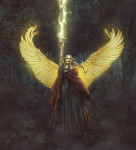
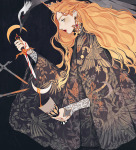

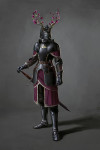
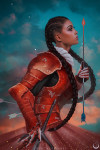


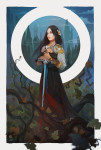
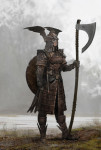
January 7, 2020
(Fiction) The Keep of the Mage-King
The base of the island, worn smooth by the waves and crusted in barnacles, was slightly narrower than the rest. An uneven triangular cave exposed the grotto that was the only ingress to the interior, known as the Keep of Solomon. The approach was magnificent. The pale rock rose before us like a throned god. Bits of greenery erupted in small tufts from the cracks. Seabirds made nests at every hold and circled continuously about amid gentle calls. The sounds of the birds and the waves bounced in echo as the oarsmen took us into the grotto’s archlike natural passage. Beyond was a cavern, begun by nature but enlarged by men. Much of the roof was built of the same fitted stone as the castle above. There was an L-shaped stone dock and a long ramp into the water with stone steps to one side, caked in ocean slime. At the back were a number of small craft, similar to ours but covered in taut canvases and lashed to metal piers. A solid brick ramp rose up from the dock to the back of the hall, where it passed under a large pointed arch with raised portcullis. The passage on the other side was open to the sky, and a narrow shaft of sunlight broke from it at an angle over the water.
Past the arch, the ramp passage turned a sharp 90 degrees to the right, rising steeper to a level platform where it turned a sharp 90 degrees back to the left and climbed to the main gate, which was inside an open stone mouth. The bearded face it was attached to filled half the height of the high defensive tower. Between the portcullises of its throat was a set of heavy swinging doors, then open. We were led up the ramp and around the rock island through six more minor holds, each guarded by the open mouth of a different face until finally we reached the top. From the main courtyard, I could see the seven spires of the island keep rising high above. Each tower belonged to a different Master. The one directly above was slightly taller than the others. Snarling metal dragons leaned from the corners of the roofs. When it rained, they deposited the water via their snouts into cisterns, thus providing the Keep with its fresh water. There was no plumbing and no electricity inside. By order of The Masters, the Keep of Solomon was to be “perfectly preserved,” which is to say kept as it was after dramatic expansions and renovations in the 16th and 19th centuries. The High Arcane seemed unwilling to contemplate anything more. In hindsight, it was a sure sign of what was to come. A regime that can no longer imagine constitutional change is already a relic of the past and irrevocably doomed.
It was cold and drafty inside, as castles were. The hall to which I was taken seemed to have been decorated by Master Thrangely, the prodigious hunter. In addition to the various relics of his native Egypt, the walls were covered in the mounted heads of every kind of ibex and duiker and antelope and dik-dik and oryx and gazelle that could be found, arranged from smallest to largest. My room was spartan but generous, with more space than furniture. I had a bed and a chair and a washbasin which was refilled for me twice a day. There was a single window out of which I could see the Adriatic and parts of the Keep. The circle of pointed towers gave it the appearance of a giant irregular crown, as if the pale rocks from which it erupted was the withered, white-haired head of the mage-king Solomon himself. I had ample room to pace, and a giant Persian rug on which to do it. I had the call of the birds and lap of the waves to put me soundly to sleep each night. But there was nothing to do. Although my door was not locked, the guard outside prevented me from leaving, and I received no visitors. My only distraction was the small origami dragon that rested on a perch under a dome of glass, like a cake cover. It would flutter its off-white wings when I came near. If I touched the glass, it would breath fire, and I could feel the heat. But if I lifted the glass, there was only folded paper.
The entirety of my confinement was irredeemably tedious—not because of the boredom, but because it was unnecessary. I knew exactly what would happen. There was no mystery, and so no suspense. I wanted to open the door and scream “Oh, just get on with it!” but I knew they couldn’t. The austerity and solemnity with which they went about it all was half the point—to demonstrate severity. Not for the accused, of course. For everyone else. One sees the same slow pageant in any carriage of law or custom, whose relevant bits last minutes or even seconds. The rest is a dance. The pomp and procession before a marriage is no different than that before a witch’s execution, or the enthronement of a new law. It lulls the participants into unity so that a new reality may be forged among them—a couple is joined, a man condemned, a law passed—without it seeming a change. If those in power demonstrate enough seriousness in the doing, then everyone assumes it must be so for all the effort given, especially if the rituals in question are so old as to have lost all use and vitality except as ostentation.
rough cut from my five-course occult mystery, FEAST OF SHADOWS. Part One is available now. The epic urban fantasy concludes this spring with Part Two.
January 6, 2020
The devil pales beside the man who owns a truth. —E.M. Cioran, “A Short History of Decay”
January 5, 2020
(Art) The Thrones of Michael Whelan
[image error]
Perhaps because he’s been commissioned so often for book covers, the famed fantasy artist has always been a master of the “regal stance,” where a single character strikes a dramatic pose in front of a fantastic setting — versus someone like Frazetta, whose characters were always about to deliver a death blow. But it seem Mr. Whelan also has a thing for “enthroned” characters, either literal or figurative.














January 4, 2020
My Dungeon Shook
My Dungeon Shook: Letter to My Nephew on the One Hundredth Anniversary of Emancipation
from “The Fire Next Time” (1963) by James Baldwin, a potent and lyrical essayist.
Dear James: I have begun this letter five times and torn it up five times. I keep seeing your face, which is also the face of your father and my brother. Like him, you are tough, dark, vulnerable, moody – with a very definite tendency to sound truculent because you want no one to think you are soft. You may be like your grandfather in this, I don’t know, but certainly both you and your father resemble him very much physically. Well, he is dead, he never saw you, and he had a terrible life. He was defeated long before he died because, at the bottom of his heart, he really believed what white people said about him. This is one of the reasons that he became so holy. I am sure that your father has told you something about all that. Neither you nor your father exhibit any tendency towards holiness. You really are of another era, part of what happened when the Negro left the land and came into what the late E. Franklin Frazier called “the cities of destruction.” You can only be destroyed by believing that you really are what the white world calls a “nigger.” I tell you this because I love you, and please don’t you ever forget it.
I have known both of you all your lives and have carried your daddy in my arms and on my shoulders, kissed him and spanked him and watched him learn to walk. I don’t know if you have known anybody from that far back, if you have loved anybody that long, first as an infant, then as a child, then as a man. You gain a strange perspective on time and human pain and effort. Other people cannot see what I see whenever I look into your father’s face, for behind your father’s face as it is today are all those other faces which were his. Let him laugh and I see a cellar your father does not remember and a house he does not remember and I hear in his present laughter his laughter as a child. Let him curse and I remember his falling down the cellar steps and howling and I remember with pain his tears which my hand or your grandmother’s hand so easily wiped away. But no one’s hand can wipe away those tears he sheds invisibly today which one hears in his laughter and in his speech and in his songs. I know what the world has done to my brother and how narrowly he has survived it. And I know, which is much worse, and this is the crime of which I accuse my country and my countrymen and for which neither I nor time nor history will ever forgive them, that they have destroyed and are destroying hundreds of thousands of lives and do not know it and do not want to know it. One can be–indeed, one must strive to become–tough and philosophical concerning destruction and death, for this is what most of mankind has been best at since we have heard of war. (Remember, most of mankind is not all of mankind.) But it is not permissible that the authors of devastation should also be innocent. It is the innocence which constitutes the crime.
Now, my dear namesake, these innocent and well meaning people, your countrymen, have caused you to be born under conditions not far removed from those described for us by Charles Dickens in the London of more than a hundred years ago. I hear the chorus of the innocents screaming, “No, this is not true. How bitter you are,” but I am writing this letter to you to try to tell you something about how to handle them, for most of them do not yet really know that you exist. I know the conditions under which you were born for I was there. Your countrymen were not there and haven’t made it yet. Your grandmother was also there and no one has ever accused her of being bitter. I suggest that the innocent check with her. She isn’t hard to find. Your countrymen don’t know that she exists either, though she has been working for them all their lives.
Well, you were born; here you came, something like fifteen years ago, and though your father and mother and grandmother, looking about the streets through which they were carrying you, staring at the walls into which they brought you, had every reason to be heavy-hearted, yet they were not, for here you were, big James, named for me. You were a big baby. I was not. Here you were to be loved. To be loved, baby, hard at once and forever to strengthen you against the loveless world. Remember that. I know how black it looks today for you. It looked black that day too. Yes, we were trembling. We have not stopped trembling yet, but if we had not loved each other, none of us would have survived, and now you must survive because we love you and for the sake of your children and your children’s children.
This innocent country set you down in a ghetto in which, in fact, it intended that you should perish. Let me spell out precisely what I mean by that for the heart of the matter is here and the crux of my dispute with my country. You were born where you were born and faced the future that you faced because you were black and for no other reason. The limits to your ambition were thus expected to be settled. You were born into a society which spelled out with brutal clarity and in as many ways as possible that you were a worthless human being. You were not expected to aspire to excellence. You were expected to make peace with mediocrity. Wherever you have turned, James, in your short time on this earth, you have been told where you could go and what you could do and how you could do it, where you could live and whom you could marry. I know your countrymen do not agree with me here and I hear them. saying, “You exaggerate.” They do not know Harlem and I do. So do you. Take no one’s word for anything, including mine, but trust your experience. Know whence you came. If you know whence you came, there is really no limit to where you can go. The details and symbols of your life have been deliberately constructed to make you believe what white people say about you. Please try to remember that what they believe, as well as what they do and cause you to endure, does not testify to your inferiority, but to their inhumanity and fear.
Please try to be clear, dear James, through the storm which rages about your youthful head today, about the reality which lies behind the words “acceptance” and “integration.” There is no reason for you to try to become like white men and there is no basis whatever for their impertinent assumption that they must accept you. The really terrible thing, old buddy, is that you must accept them, and I mean that very seriously. You must accept them and accept them with love, for these innocent people have no other hope. They are in effect still trapped in a history which they do not understand and until they understand it, they cannot be released from it. They have had to believe for many years, and for innumerable reasons, that black men are inferior to white men. Many of them indeed know better, but as you will discover, people find it very difficult to act on what they know. To act is to be committed and to be committed is to be in danger. In this case the danger in the minds and hearts of most white Americans is the loss of their identity. Try to imagine how you would feel if you woke up one morning to find the sun shivering and all the stars aflame. You would be frightened because it is out of the order of nature. Any upheaval in the universe is terrifying because it so profoundly attacks one’s sense of one’s own reality. Well, the black man has functioned in the white man’s world as a fixed star, as an immovable pillar, and as he moves out of his place, heaven and earth are shaken to their foundations. You don’t be afraid. I said it was intended that you should perish, in the ghetto, perish by never being allowed to go beyond and behind the white man’s definition, by never being allowed to spell your proper name. You have, and many of us have, defeated this intention and by a terrible law, a terrible paradox, those innocents who believed that your imprisonment made them safe are losing their grasp of reality. But these men are your brothers, your lost younger brothers, and if the word “integration” means anything, this is what it means, that we with love shall force our brothers to see themselves as they are, to cease fleeing from reality and begin to change it, for this is your home, my friend. Do not be driven from it. Great men have done great things here and will again and we can make America what America must become. It will be hard, James, but you come from sturdy peasant stock, men who picked cotton, dammed rivers, built railroads, and in the teeth of the most terrifying odds, achieved an unassailable and monumental dignity. You come from a long line of great poets, some of the greatest poets since Homer. One of them said, The very time I thought I was lost, my dungeon shook and my chains fell off.
You know and I know that the country is celebrating one hundred years of freedom one hundred years too early. We cannot be free until they are free. God bless you, James, and Godspeed.
Your uncle,
James
January 3, 2020
(Fiction) A Simple Exorcism
[image error]
He was making a proper nuisance of himself, whoever he was. I could hear the screams from the street. I stepped from the car and met the officer in charge, a woman named Ballantine. I didn’t know her, but I’d seen her around—at PEA meetings, I think, back when they still thought I might make a good role model for the junior officers. She had a potential shooter upstairs but seemed more terrified at the immediate prospect of having to explain why I’d been summoned in lieu of SWAT.
“Thanks,” she said, extending a hand in greeting.
“Sure, sure.” I looked up at the building. The fire escape zigzagged down all six floors of the brick facade. Window-mounted AC units stuck out like bit tongues. “What do we got?”
“I know this isn’t really your thing, but—”
“It’s all right. Usually by the time I arrive, there’s already a stiff. Nice to get out in front of one for a change.”
“Luckily, we have him isolated. Before there are pictures of us charging in, guns blazing, on the evening news, I thought we should at least try and talk him down. Word is, you speak this guy’s language, if you know what I mean.”
The yelling resumed and she led me in silence to the door.
“And what language is that exactly?”
Ballantine led me up the stoop. “One of the patrolmen is the son of a rabbi. He said it sounded like Aramaic.”
“Do people still speak Aramaic?”
She shrugged. “This guy does.”
Another bout of shouting filled the foyer as we entered. Mailboxes were on the left. Stairs were on the right. The super’s residence was at the back. Somewhere not too far away, a baby was crying.
“Fifth floor,” Ballantine said, making it clear she wasn’t coming. The noise was louder inside, and she had to raise her voice. “The sarge is up there. Fair warning. He’s not real good with female officers.”
“And the family?”
“Taken away by ambulance. Father, mother, adult daughter.”
“Hurt?”
“No.” The sounds stopped again and her voice fell to a whisper. “Just really shaken up. The mother has some kind of illness, I gathered. Supposed to be serious. The ambulance was mostly for her. The other two went to make sure she was okay.”
“Anyone else in the unit?”
“Just the evil spirit.” Ballantine smiled in jest.
I started up the stairs, four flights to the top. The yelling came and went and got louder around each turn. Residents, who I’m sure had been directed to stay inside their homes, peered from behind cracked doors. As I passed the third floor, I felt a pulse hit the inside of my skull and leaned against the wall for a moment. I pressed my palm flat against my temple. I smelled cumin and coriander. On the fourth floor, I smelled new carpet. The scent itself was pleasant enough, but I figured it was a mixed blessing for the tenants who had to wonder, as I did, what had happened in one of the units that was serious enough to leave the landlord of that place no choice but to spend the money.
A patrolman was crouched against the wall on the final landing, just below the fifth floor. He looked to be about half my age. I removed my firearm, holster and all.
“Hold this.”
He looked at it. “You know he’s armed, right?”
“That’s what they said on the radio.” I kept the weapon extended.
He looked at it. “Your funeral.” He took it with a shrug.
“Just follow your damned orders!” The uniformed sergeant at the top of the stairs barked down in an urgent whisper.
I walked up as the screaming started again. Our guy was in 507. He was pissed about something and letting the whole world know. Language definitely sounded Semitic, like Arabic or Hebrew, with lots of soft consonants and recurrent syllables.
I stood close to the sarge and kept my voice down. “How long’s he been in there?”
“Not sure.”
The man’s name tag said Rollins, and he was as haggard as you’d expect for a man who remained a sergeant into his late 50s. His ruddy jowls had started to sag, along with his uniform, but he had hard eyes that I suspected had gotten harder every year. He used them to glance over me. Nothing sexual. Just checking me out, deciding if I was up to snuff.
“Few hours maybe,” he said. “A few of the residents mentioned they heard sounds of fighting a little after lunchtime. Walls here aren’t real thick, in case you haven’t noticed.”
I heard the baby cry again, fainter this time. “Shouldn’t we clear the building?”
“Headquarters didn’t want to cause a panic,” he said sarcastically.
I nodded. “We have an ID?”
He shook his head. “Supposed to be some kinda faith healer. Family’s from Nigeria or Ghana or some shit like that. Wife had meningitis and they brought this asshole in to take the evil spirit away. Then he went nuts or something. I don’t know.” He squinched the side of his face like it was all a bunch of hooey.
“You been inside?” I motioned toward the half-open door just down the hall.
He nodded in the affirmative.
“Any mirrors?”
“Mirrors?”
“Yeah,” I said. “You know, reflective glass. Shows you what you look like.”
He scowled. “Didn’t notice. I was too worried about the raving asshole with the gun. And getting the family to safety.”
“What about a TV?”
He thought for a second. “Yeah. Flat screen in the living area. Why?”
I took off my sport coat and tossed it over the balustrade. It would only constrict me if there was a tussle. I unwound the chain on my wrist, the one dangling the little silver talisman, and fastened it around my neck like an ordinary necklace. The chain was visible but not the carved silver disc, inlaid with a drop of polished obsidian, which hung below the line of my dress shirt.
“You sure you’re gonna be okay in there? Patrolman Meyers is an ass,” the sergeant said, motioning to the kid holding my gun, “but he’s not wrong. Guy’s got a gun.”
I nodded as I rolled up my sleeves. “Just keep everyone back. No matter what you hear. No matter how crazy it sounds. Alright? Keep the trigger fingers out until you hear from me. You’ll only make things worse.”
“Whatever you say, Detective.”
He was being sarcastic again, but I didn’t care. Sgt. Rollins had the demeanor of a man who knew how to keep control of his men, which is all that mattered. I trusted him—in a way. I trusted that after two and a half decades on the force, he would do everything he could to make it the last few years to retirement. He wasn’t going to play hero.
I stepped lightly to the door and peered in. The guy must have caught sight of me, because he started screaming again in that unusual tongue. Now it was the same phrase over and over, like he wanted me to do something—get back, maybe. Or let him out. He was on the floor in the living room kneeling near the inside edge of a large, heavy salt ring. He definitely had a gun, but judging from how he held it—by the barrel—may or may not have known what it was for. I pushed the door open slowly, my body turned in profile to make myself less of a target—just in case. I took a step and waited for a reaction. There was a closet door to my right and a small enclosed kitchen to my left, where a light was flickering randomly. There was a couch and a tall potted plant across from the worn Ikea bookcase next to the TV. There was a slider door at the back, bolted shut. And no balcony.
Only one way out.
The room had bright, colorful African decor. A zigzag-patterned rug had been rolled up and put out of the way, probably to make room for the salt. An open thirty-pound sack of the stuff sat next to the TV stand, topped with an inverted steel funnel. The ceiling glistened slightly as if covered in a thin layer of sweat. A few drops ran down the walls.
The guy inside the ring was clearly African. He wore a white kufi cap on his head and matching gown. There were dots of white pigment across his cheeks and brow. His right hand gripped a Smith & Wesson .38 revolver. He was white-knuckling it. His left hand held a wooden figurine.
He yelled again and shifted his grip on the gun. It went up, properly this time.
There went that theory.
I opened my hands and arms wide. “I’m not armed.”
He uttered what I’m sure was an insult—terse and angry. His voice didn’t quite match his body. Too deep. And there was a slight lag between the sound and his lips, like a soundtrack just a bit out of sync with the film.
I pulled my eyes from the gun barrel pointed at my chest and stole a quick glance at the earth-stained figurine in his other hand. It was about a foot tall and shaped like a fat peg or stake. He gripped it by the tapered end, which wasn’t needle-sharp but definitely wasn’t dull either. The top and center of the piece had been carved to resemble a head and body. The face had a simple, snarling visage. There was a thin, angular chain wrapped five or six times around the torso. It was the color of cast iron and looked hand-made. No two links were the same size or shape. Dangling from one of them was an open padlock, also cast iron. I guessed it was a spirit totem of some kind. I hadn’t seen one like it, but the symbolism of lock and chain are darn-near universal.
“Who’m I talking to?” I asked as I shut the door behind me. I reached back and locked it without taking my eyes off the man.
He laughed desperately. His dark skin had the kind of crosshatched wrinkles you get after a life in the sun, especially at the corners of his mouth and eyes, which were crazy bloodshot. But under that, he looked like someone’s thin, aged grandpa.
“So what do I call you?”
He laughed again, longer and louder. He wasn’t stupid enough to tell me his real name, which is the easiest way to bind an entity. That’s why all the old medieval texts had three or four names for every “demon.” It was a ruse on their part to evade capture. Most of them weren’t true demons, of course, just plain ol’ malignant spirits, like this one—opportunists, for the most part, no different than a vulture or a coyote, and just as skittish, easily frightened by guardian statues and sacred objects. Most tend to hunt at night, when the pickings are easier. As long as you had the right tools, they’d usually flee and take their chances on an easier target. But this one hadn’t. Best guess, the witch doctor had managed to get the bastard out of the sick wife but something went wrong and he couldn’t lock the chain in time. Maybe his hands shook. Maybe the lock was stuck. Who knew?
“What do you want?” I asked.
His bloodshot eyes glanced to the salt ring.
“Well, see, that’s a problem.” I took another step forward.
He cocked the revolver calmly and deliberately. I heard the click in the now-quiet room. I had the sense that everyone in the building was holding their breath, trying to hear our words, which I’m sure rumbled through the thin walls as an undecipherable baritone.
I looked at the gun barrel. I was very aware that at that range, there wasn’t much chance he’d miss and that any hit had a decent shot of being fatal—or at least making sure I had to shit into a bag for the rest of my life. At least the old shaman had made a good-sized salt ring—not just wide but thick as well. That, plus the protective dots under his eyes, suggested experience. Pouring a ring like that takes a lot of salt and a lot of time and is a bitch to clean up after. Folks who don’t know any better read the instructions in a book and think any old ring will do. They use half a box of Morton’s, make a thin circle barely big enough to move in, and call it a day. But all it takes is one misstep to scuff a ring like that, and then it doesn’t matter how good you are. It’s game over.
This guy had played it safe. He knew not to take chances. But then, he also hadn’t been too worried. He’d used a salt ring rather than something durable, like a painted conjuring circle with binding runes. That said to me he’d probably done simple exorcisms all the time back home, wherever that was, and hadn’t expected this one to be any big trouble.
It was a mistake—one I wasn’t going to repeat. I needed to know what I was up against.
I kept my arms open and nonthreatening. “You can shoot me if you want. I can’t stop you. But if you do, my friends are gonna shoot back.” I nodded toward the hall. “I’ll be dead, and so will that man you’re in, which means this whole place will turn into a crime scene and no one will touch anything until the forensics guys get here, which could take a while, especially since we’re coming up on rush hour.”
I nodded to the round plastic clock on the wall, just over the TV. I didn’t need to. I knew what time it was. It was just an excuse to glance down at the blank screen and confirm, up close, my suspicion that the two of us were alone and that the man’s reflection matched his appearance. Which it did. That ruled a few things out.
Easier things, unfortunately.
I took another careful step forward. I wasn’t more than ten feet from the ring by then.
“You’ll be trapped in that circle,” I said “for hours, unbound and without a host. How long can hold your breath?”
His hand clenched the gun in anger. He was sweating. The walls and ceiling were sweating with him. I tried to swallow the lump in my throat nonchalantly, but it was as stubborn as the ghoul.
Here’s the thing. Exorcism is tricky. It’s not a fight as much as a hostage negotiation. And a process of elimination. You start by ruling things out. It was always possible I was facing a witch possessing the old man from afar. But then, any human probably wouldn’t be speaking Aramaic—or whatever it was. More than that, a salt ring doesn’t have any effect on the living, except to annoy whoever has to clean it up. So if it was a witch or warlock, he or she could’ve gotten up and walked out hours ago.
I was pretty sure it wasn’t demonic either. True demons are powerful entities that aren’t readily trapped by salt rings and the like. You need a ring of living wills, priests and paladins untainted by sin and strong enough to stand against a demon and so to trap it. And anyway, the saints locked up all the demons ages ago.
It could’ve been a ghost, the free-floating spirit of a dead person, but they generally can’t possess the living—at least, not unless the host is a medium or other sensitive. But ghosts aren’t rational. They don’t realize they’re dead, which is why they’re stuck here reliving the trauma of their lives. That’s why a ghost is always dangerous, by the way. Even the friendly ones can turn violent without warning, like a wild animal. And because they’re reliving old trauma, their actions are detached from their surroundings, which is creepy as fuck when you see it. They speak in strange non sequiturs and move through walls where once there were doors. They don’t do things like calmly point guns and ask to be set loose.
Given the mirror test, and Ballantine’s report that the wife was seriously ill, I was 99% sure this old scratch was a “carrion ghoul,” for lack of a common name. They’re pretty much everywhere—opportunistic spirits that prey on the sick and sinful. In the Philippines, they’re called aswang, and it’s said that in daytime, they appear as the living, but with a nervous tic and bloodshot eyes—like this guy. At night, they become incorporeal and waft through the streets in search of the sick and dying so they can slurp their intestines. Those kinds of details are usually exaggerated, but relevant. In the old days, for example, intestinal disease is how most people got sick and died, so it would’ve been the spirit’s key point of entry.
In the old days, people all over the world, from Peru to Siberia, consulted a witch doctor when a family member fell victim to a sudden, strange, undiagnosable illness. In Greenland, tupiluq is the name of both the ghoul and the ivory totem the local shaman will carve to imprison it—or use to send it to your enemies. For an extra fee, of course.
If I was right, that meant neither vinegar nor raw iron nor running water would have any effect, a fact confirmed by the totem he was clutching in his hand, whose chain had enough iron to throw off anything susceptible, like a jinn. Just one more reason why carrion ghouls are just about the worst kind of infectious spirit. Because their hosts are sick, they can burrow deep and get a tight grip. You can’t just scare them out with talismans and holy water. It takes violence. You have to pry them away. From the inside. Like pulling a tick.
That meant, first, I had to know where the sickness was. That’s usually not a problem for a witch doctor, who has the help of the family to share all the relevant details. I had fuck-all.
Second, I absolutely, positively could not be wrong. If you go stabbing things into the wrong body part, or if it’s not a carrion ghoul after all, well . . .
The good news, if you could call it that, is that there’s a foolproof diagnosis, or so our ancestors have taught us. If you can get close enough to see it, the reflection of the world in the glisten of the eyes is always upside down.
I looked at the heavy salt ring. I didn’t have a choice. I was gonna have to get inside with it. My adversary seemed to understand my thoughts, because he smiled an awful, knowing smile and lowered the gun.
“Alright,” I whispered. “You wanna fight, let’s fight.”
I had exactly one advantage. It takes a lot out of a spirit to worm its way into a new host, especially a witch doctor, who would know how to resist. On top of that, this one had been yelling, on and off, for an hour or two at least. Already his breath was long and irregular. He looked tired. Thirsty, too. I just needed a distraction.
I showed him my empty hands, like a stage magician before a trick. He watched them intently with those horribly bloodshot eyes as I reached into the pocket of my slacks and pulled out my keys. A small pocket knife dangled. I showed it to him, as if to say “See? Nothing to worry about.” I opened the inch-long blade. It was sharp. It slit the skin of my forearm with no trouble. I clenched my teeth and hissed. It stung. It wasn’t a big cut, but it was enough to draw blood.
The old witch doctor licked his lips as I slipped my keys back into my pocket and stepped toward the circle, arm bared. He stood and stepped back from the edge, making room for me, but his eyes didn’t move from the deep red liquid slowly growing into a fat drop on my skin.
I lifted my foot to step inside the ring when he shouted and shoved the .38 in my face. I was close enough that I could hear the metal jostle with the motion and I froze. He sniffed the air once. Then twice. He was still clutching the totem in his left hand—no doubt to keep it away from me—and he lifted it and tapped his chest.
I knew what he meant. He could smell the silver.
Fucker.
I scowled as I unhooked the talisman. But since my arm was still bleeding, the drop ran as soon as I moved. He watched it jump from my elbow and hit the floor in a tiny splatter.
It was only a moment. But it was enough.
I ripped the talisman from my blouse and thrust it forward. It spun in the air, glimmering, and he flinched and turned with a growl. I sprang forward and the gun discharged the very second I knocked it away. The bullet hit the wall as I tackled my adversary to the floor.
See, kids? This is why you always, always, always supersize your salt rings. His head landed right next to the far edge. If that circle had been any smaller, my tackle would’ve forced him across the seal, and then who knew?
I had all my weight on him as I dangled the talisman in front of his eyes. I was sure I’d got the better of him then. But I was wrong. Fucker was strong. I could feel it immediately. That was why the old man had had so much trouble. In an instant, I knew I’d never be able to hold him. I leaned down quickly and caught my reflection in the glisten of his bloodshot eyes.
Definitely upside down.
He lifted me. Like I was nothing. He couldn’t approach the talisman, so he let go of the totem, which bounced on the floor, and lifted the whole of me with hardly any effort. That kind of strength was unusual. It meant he was old—damned old—which made sense, I suppose, given his language of choice. I should have paid more attention to that.
Lesson learned.
Only now I was in real trouble. I sacrificed the talisman by throwing it in his face, which caused him to flinch and swat it away. He had to let one hand go for that and I fell on my ass. The action pulled me free of his other hand, and I scrambled to the fallen gun and threw it outside the ring. It landed hard on the bathroom tile just as I felt my adversary bite into my calf. In the scramble, my nice department-store slacks had worked up my leg, revealing my skin. I felt teeth puncture my flesh. To the muscle. He hadn’t bit me the way an angry child bites you, to inflict pain. He bit me the way you bite into a tough steak, the way you bite something you intend to tear loose with your canines and swallow. He was eating me, and I screamed. It hurt. It hurt so bad my hands started shaking involuntarily and it took every last ounce of self-control not to turn around and push and kick and fight him off, which is every creature’s natural response to being eaten alive. Instead, I whelped and whimpered as I used my flat palms to drag my torso in an arc across the hardwood. My quivering fingertips brushed against the wooden figurine, but they only managed to knock it farther away.
“Fuck!”
That’s when he pulled with his head and tore a flap of blood-wet skin from my leg.
It’s the weirdest thing, let me tell ya. It hurts like a motherfucker, of course, but it’s the raw sensation that gets you. Your dermis lifting. Air on your muscles.
I screamed again. And I meant it this time, every last unintelligible syllable. It was primal—a completely irrational, uncontrollable wail. And with it came panic. There had already been a gunshot. If my scream was enough to convince my colleagues to burst through the door, if they saw us like that, they would’ve opened fire. No questions asked. Not only would the old witch doctor be dead before he hit the floor, I would be fucked. Because now I was seriously wounded, which meant if his host died, the carrion ghoul would rush out of him and into me, which I’m pretty sure was the whole point of the attack. He had seen that I was some kind of authority figure. Once he was inside me, someone was sure to let him out of the circle by rushing me to the hospital—an entire building of sick people for him to feed on.
There was no way I was going to let something that powerful get loose. In my body.
I kicked the old man with a heeled boot, right in the mouth. Once. Twice. Three times. But all I did was loosen some teeth and bloody the guy’s lip. Not that I’m weak or out of shape or anything. I was quite the kickboxer there for a while. This ghoul simply didn’t care. I went to kick again and he knocked my leg out of the way and lunged for my face. I got the old man’s dirty, sweat-salty, nicotine-stained fingers in my mouth and up my nose and I gagged. The ghoul forced my head back and down the floor. Hard. He opened the witch doctor’s mouth over me, like he was going breathe himself out. It stank like cigarette ash.
That was it.
“Thanks,” I said.
I head-butted the guy. It didn’t do much, but it was enough for me to lunge for the totem. The ghoul’s powerful hands grabbed me immediately and pulled me back. But I didn’t fight. I let him take me. I turned and rammed the wooden point right into the old guy’s chest, into his lungs.
The room dropped underneath me—as if the entire building, the entire city, had suddenly sunk four feet in space. I fell hard, along with everything else. The TV toppled and smashed on the hardwood. Books and pictures scattered. Water burst from the toilet. The lock in my hand clicked shut from the force, and that was it. I collapsed, panting hard and in hella pain.
I heard banging on the front door. The handle jiggled and there were loud calls for a battering ram.
“Shit.”
I didn’t have long.
I struggled to my feet, where I discovered immediately that my right leg could no longer support my weight. Blood trickled down my skin into my shoe. I grabbed the unconscious old man by the arms and dragged him, limping, through the scattered salt to the bathroom. I pulled a heavy bath towel from the rack, wet it in the still-churning toilet, and wiped the blood off his mouth. I checked the hole in his gown from where I’d plunged the sharp end of the figurine. The skin underneath was clean and bare. And he was breathing.
The first swing of the battering ram cracked the frame but didn’t completely dislodge the bolt. I hobbled back to the living room and snatched the totem. When the door gave way and the patrolmen ran in, I was sitting on the toilet seat next to the moaning witch doctor. I had the rolled towel pressed to the back of my bloody calf.
“What took you so long?” I asked. I showed them the blood on the towel. “I’m gonna need a stretcher.”
My colleagues swarmed around, Ballantine and Rollins and everyone, trying to make sense of the scene—the scattered salt, the shattered television, the fallen books and pictures, the wet walls, the blood on the hardwood. They tried to carry me out of the apartment, but I absolutely refused to move from my porcelain throne until the paramedics came. Once I was on the stretcher, one of the EMTs tried to take the towel but I pointed across the room instead and demanded my necklace. I used some nasty cuss words to make everyone feel awkward and forget about the towel.
Ballantine took my statement at the hospital while a young male resident stabbed my leg with a series of fat needles. I got a local anesthetic, a bunch of precautionary vaccines, and a shit-ton of stitches. He didn’t say that he knew I’d been bitten, but he knew I’d been bitten. I said the old man was basically harmless but that he might’ve had dementia or something and that I’d tripped and fell over the TV, which was why it was broken, and that was how I’d gotten cut.
“What about the gunshot?” she asked.
“He didn’t understand why the cops were there. He was scared. He was sweating. His hands were shaking. I convinced him he wasn’t in danger, and when he went to lower the weapon, it slipped and discharged.”
She didn’t believe me. At all. But she didn’t ask too many questions. Since no one had died and I wasn’t pressing charges, there was no real incentive to make a big deal out of anything. That would’ve done nothing but piss off a colleague and elicit more paperwork. So she gave me a look to let me know she wasn’t an idiot and called it a day.
That night, I treated myself to a Cuban from my secret stash. I sat on my balcony in my underwear with my bandaged leg on the railing and smoked that cigar to a nub while pulling swigs from a bottle of fancy champagne. Just me and my drinking buddy: a foot-long wooden figurine, wrapped in a tarnished chain and locked tight. I snuck it out swaddled in the towel like the little baby Jesus. We had a nice chat that night. Pretty sure all he did was curse me in Aramaic. Something about a book.
The next day, I left the pain pills at home and walked with a pronounced limp into the office. I sat at my desk. I unlocked the bottom drawer of my filing cabinet and pulled it open with a grunt. It was getting heavy. And full. There was a painted mask, a goblet, a small collection of carved votive candles, a handful of polished stone bezoars, feathers, false talismans, a pygmy head, ampules of holy water, the teeth of a saint laid into a tarnished silver Coptic cross, a broken wand, a rabbit’s foot, the taxidermized claw of a giant extinct salamander, wood-framed eyeglasses with crystal lenses, and more. I tossed the wooden figurine onto the pile, rolled the drawer shut, and locked it.
I looked around the office. “The Killing Field” was stuffed. A few of my colleagues were chatting. Lieutenant Miller was getting herself a coffee at the fancy new grind-and-brew vending machine. I turned on my computer and typed my password and a pleasant ding welcomed me back. I wondered how many different chimes the software company had tested before they settled on that specific one.
I sat back and looked at the screen.
I couldn’t prove it, but it sure seemed like there was a helluva lot more shit happening lately. And of the serious kind, too.
rough cut from my five-course occult mystery, FEAST OF SHADOWS. Part One is available now. The epic urban fantasy concludes this spring with Part Two.



